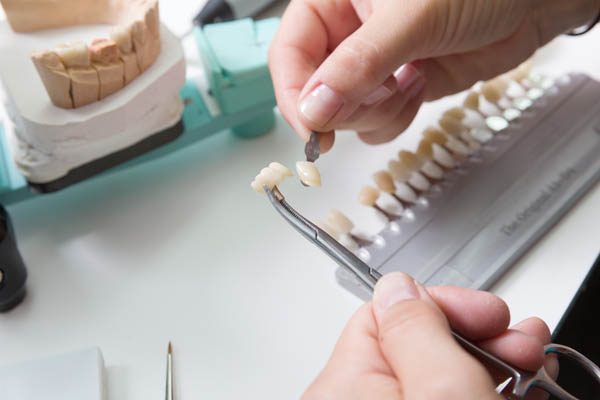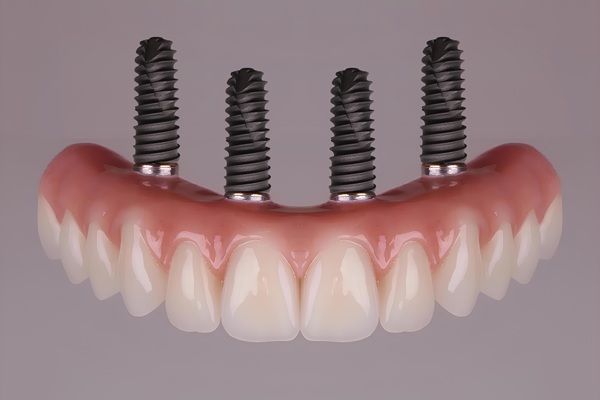How To Prevent Stains on Dental Veneers

Dental veneers are thin, artificial caps for your natural teeth. They can cover up stained teeth or coat over tooth chips or discolored spots. Dentists sometimes use them to reshape and fix the appearance of crooked, crowded, or overly-spacious smiles.
Many people choose veneers because they offer beautiful and durable results without requiring invasive procedures. The application process requires the removal of a very thin layer of tooth enamel before mounting the tooth coverings in place. While the procedure is irreversible, the results are not completely permanent; patients should expect to have the veneers replaced every 10 to 20 years. Even so, this is still considered extremely durable in the world of dental work.
Veneers allow patients to enjoy a whiter, brighter smile with more evenly shaped and sized teeth. Generally, they are more resistant to staining than natural tooth enamel, but they still can stain. Follow these three practices to help keep veneer stains away.
3 ways to prevent dental veneer staining
Veneers are irreversible, so you need to take the proper measures to keep them healthy and good-looking. Here are some tips to help you prevent staining and destroying your new, white teeth.
1. Maintain good oral hygiene
Brush, floss, and rinse your veneers similarly to how you would your natural teeth. You should brush, floss, and rinse your veneers at least once a day, but ideally, you should do so after every single meal to remove any stains and bacteria before they set in. Discuss with your dentist beforehand any specific restrictions on which types or brands of toothpaste, floss, and mouthwash to use. Each veneer situation is different and what oral hygiene materials you work with depend upon what type of veneers you have and where you have them. In general, less abrasive kinds of toothpaste and non-alcoholic mouthwashes are usually the better choices for veneers.
2. Avoid specific foods, drinks, and activities
An easy way to stop stains from appearing on your veneers is by avoiding the things that create them. Dark liquids and solids known for staining have the potential to stain dental veneers just like natural teeth. Keep away from or immediately brush, floss, and rinse after consuming this list of items or anything similar to them:
- Coffee
- Tea
- Red wine
- Berries
- Tomatoes, ketchup, and pasta sauce
- Soy sauce
- Beets
- Curry
You should also avoid tobacco products as they can cause yellowing or browning, particularly along the edges of veneers. You want to stay away from chewing on hard foods or foreign objects like hard candy, ice, and pencils or pens as well. Biting hard items can crack or erode your veneers which may reveal old stains or provide access for new ones.
3. Visit your dentist
Routine checkups and cleanings are essential to keep your veneers white, functional, and healthy. Dental cleanings are more thorough than at-home cleansings can be, so having your veneers regularly, professionally cleaned can keep them looking and feeling better. Many dentists recommend that patients with veneers visit them about every six months. Speak with your dentist to design a schedule that works for you. You should also see your dentist if you notice any damage to or changes in your veneers. Cracks and loose bonds can become worse issues if they are not attended to promptly.
Other tips for protecting your veneers
In addition to preventing unsightly stains, it is important to protect your veneers from unnecessary damage or wear and tear. One of the most harmful practices is teeth clenching or grinding, also known as bruxism. If you develop this habit after having veneers placed, talk with a dentist about treatment plans to protect your veneers and other teeth from serious damage.
While alcohol consumption in moderation is not necessarily harmful to all patients, many dentists recommend limiting it after certain types of dental work. The acids present in alcohol can inhibit dental health by slowing down healing after injury surgery. In this situation, they can also wear down the adhesives used to place veneers, crowns, and other types of dental treatment, causing them to require replacement much sooner.
Conclusion
Dental veneers can be great for fixing dull or off-colored teeth, but you must look after them properly so that they do not discolor too. Improper oral hygiene and some foods, drinks, and activities can still stain your artificial teeth. Regularly visit your dentist and adhere to his or her advice to help keep your veneers sparkling white.
<em>Request an appointment here: <a href="https://www.southfloridadentalarts.com"> https://www.southfloridadentalarts.com</a> or call South Florida Dental Arts at <a href="tel:3052304041">3052304041</a> for an appointment in our Miami office.</em>
Check out what others are saying about our dental services on Yelp: Dental Veneers and Dental Laminates in Miami, FL.
Recent Posts
Dental veneers are a popular cosmetic dentistry solution that can transform the appearance of your smile. These thin, custom-made shells cover the front surface of teeth, addressing issues such as discoloration, chips, gaps, and minor misalignments. Dental veneers offer a minimally invasive way to achieve a natural, radiant smile, making them an excellent choice for…
Patients interested in cosmetic dental treatment may consider a smile makeover. During this procedure, a dentist transforms a patient's smile using restorations. People who want to improve certain aspects of their smiles, such as misshapen teeth, slightly crooked teeth, chipped teeth, discolored teeth, and gaps in between their teeth, may want to consider veneers. These…
In cosmetic dentistry, there are all kinds of approaches used to improve smiles, but porcelain veneers happen to be one of the most popular. Continue reading to learn more. Over the years as dental technology has improved, so have the techniques and approaches that are used to keep the teeth healthy and attractive.Porcelain veneers are…
When it comes to tooth restoration, two standard options include dental veneers and crowns. Dental veneers are thin covers adhered to the tooth to create a traditional and classic shape. Dental crowns, on the other hand, are caps. Dentists place crowns on top of the teeth to protect, restore or cover teeth. While both can…


